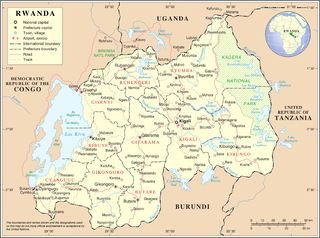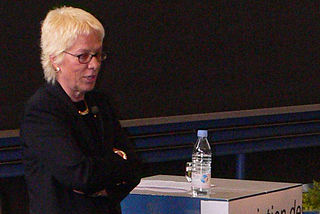
The International Criminal Tribunal for Rwanda was an international court established in November 1994 by the United Nations Security Council in Resolution 955 in order to judge people responsible for the Rwandan genocide and other serious violations of international law in Rwanda, or by Rwandan citizens in nearby states, between 1 January and 31 December 1994. The court eventually convicted 85 individuals at a cost of $1.3 billion.

International criminal law is a body of public international law designed to prohibit certain categories of conduct commonly viewed as serious atrocities and to make perpetrators of such conduct criminally accountable for their perpetration. The core crimes under international law are genocide, war crimes, crimes against humanity, and the crime of aggression. This article also discusses crimes against international law, which may not be part of the body of international criminal law.

United Nations Security Council resolution 955, adopted on 8 November 1994, after recalling all resolutions on Rwanda, the Council noted that serious violations of international humanitarian law had taken place in the country and, acting under Chapter VII of the United Nations Charter, established the International Criminal Tribunal for Rwanda (ICTR).

United Nations Security Council resolution 977, adopted unanimously on 22 February 1995, after recalling Resolution 955 (1994) in which the Council was to determine the seat of the International Criminal Tribunal for Rwanda (ICTR) and noting a report by the Secretary-General Boutros Boutros-Ghali, the Council decided that its seat would be in Arusha, Tanzania.

United Nations Security Council resolution 1047, adopted unanimously on 29 February 1996, after recalling resolutions 808 (1993), 827 (1993), 936 (1994) and 955 (1994), the Council appointed Louise Arbour as Prosecutor at the International Criminal Tribunal for Rwanda (ICTR) and the International Criminal Tribunal for the former Yugoslavia (ICTY).

United Nations Security Council resolution 1200, adopted unanimously on 30 September 1998, after recalling resolutions 955 (1994), 989 (1995) and 1165 (1998), the Council forwarded 18 nominations for judges at the International Criminal Tribunal for Rwanda (ICTR) to the General Assembly for consideration.

United Nations Security Council resolution 1329, adopted unanimously on 30 November 2000, after recalling resolutions 827 (1993) and 955 (1994), the Council enlarged the appeals chambers at both the International Criminal Tribunal for Rwanda (ICTR) and the International Criminal Tribunal for the former Yugoslavia (ICTY), proposed the election of two additional judges at the ICTR and established a pool of ad litem judges at the ICTY.

United Nations Security Council resolution 1347, adopted unanimously on 30 March 2001, after recalling resolutions 955 (1994), 1165 (1998) and 1329 (2000), the Council forwarded a list of nominees for permanent judges at the International Criminal Tribunal for Rwanda (ICTR) to the General Assembly for consideration.

United Nations Security Council Resolution 1932, adopted unanimously on June 29, 2010, after recalling resolutions 955 (1995), 1165 (1998), 1329 (2000), 1411 (2002), 1431 (2002), 1717 (2006), 1824 (2008), 1855 (2008), 1878 (2008) and 1901 (2009) on Rwanda, the Council noted that the 2010 target for the completion of trials at the International Criminal Tribunal for Rwanda (ICTR) could not be met, and therefore extended the terms of 16 judges at the ICTR.

United Nations Security Council resolution 1411, adopted unanimously on 17 May 2002, after recalling resolutions 827 (1993), 955 (1994), 1165 (1998), 1166 (1998) and 1329 (2000), the Council amended the statutes of the International Criminal Tribunals for Rwanda (ICTR) and the former Yugoslavia (ICTY) to address the issue of judges holding dual nationalities.
United Nations Security Council resolution 1431, adopted unanimously on 14 August 2002, after recalling resolutions 827 (1993), 955 (1994), 1165 (1998), 1166 (1998), 1329 (2000) and 1411 (2002), the Council established a pool of temporary judges at the International Criminal Tribunal for Rwanda (ICTR) in order for it to complete its work as soon as possible.

United Nations Security Council resolution 1503, adopted unanimously on 28 August 2003, after recalling resolutions 827 (1993), 955 (1994), 978 (1995), 1165 (1998), 1166 (1998), 1329 (2000), 1411 (2002), 1431 (2002) and 1481 (2003), the Council decided to split the prosecutorial duties of the International Criminal Tribunal for the former Yugoslavia (ICTY) and the International Criminal Tribunal for Rwanda (ICTR) which had previously been under the responsibility of one official, Carla Del Ponte, since 1999.

United Nations Security Council resolution 1512, adopted unanimously on 27 October 2003, after recalling resolutions 955 (1994), 1165 (1998), 1329 (2000), 1411 (2002), 1431 (2002) and 1503 (2003) on Rwanda, the Council increased the number of temporary judges serving at the same time at the International Criminal Tribunal for Rwanda (ICTR) from four to nine.

United Nations Security Council resolution 1534, adopted unanimously on 26 March 2004, after recalling resolutions 827 (1993), 955 (1994), 978 (1995), 1165 (1998), 1166 (1998), 1329 (2000), 1411 (2002), 1431 (2002) and 1481 (2003), the Council called on the International Criminal Tribunal for the former Yugoslavia (ICTY) and the International Criminal Tribunal for Rwanda (ICTR) to complete all trial activities by the end of 2008.

United Nations Security Council Resolution 1955, adopted unanimously on December 14, 2010, after recalling resolutions 955 (1995), 1165 (1998), 1329 (2000), 1411 (2002), 1431 (2002), 1717 (2006), 1824 (2008), 1855 (2008), 1878 (2008), 1901 (2009) and 1931 (2010) on Rwanda, the Council permitted three judges to complete their cases at the International Criminal Tribunal for Rwanda (ICTR) beyond their terms of office, and increased the number of temporary judges at the tribunal.

United Nations Security Council Resolution 1966, adopted on December 22, 2010, after recalling resolutions 827 (1993) and 955 (1994), the Council established a residual mechanism to conclude the remaining tasks of the International Criminal Tribunals for Rwanda (ICTR) and former Yugoslavia (ICTY). It was the final Security Council resolution adopted in 2010.

United Nations Security Council Resolution 1684, adopted unanimously on June 13, 2006, after recalling resolutions 955 (1994), 1165 (1998), 1329 (2000), 1411 (2002), 1431 (2002), 1449 (2002), 1503 (2003) and 1534 (2004) concerning the International Criminal Tribunal for Rwanda (ICTR), the Council extended the terms of 11 judges beyond their expiry dates in order for them to complete the trials in which they were sitting.
United Nations Security Council Resolution 1995, adopted unanimously on July 6, 2011, after recalling resolutions 955 (1995), 1503 (2003) and 1534 (2003) on the International Criminal Tribunal for Rwanda (ICTR), the Council permitted temporary judges at the tribunal to vote or stand as candidates in elections to the presidency of the ICTR.

United Nations Security Council Resolution 1717 was adopted unanimously on October 13, 2006; after recalling resolutions 955 (1995), 1165 (1998), 1329 (2000), 1411 (2002), 1431 (2002), 1449 (2002), 1503 (2003) and 1534 (2004) on Rwanda, the Council extended the terms of temporary judges at the International Criminal Tribunal for Rwanda (ICTR).
United Nations Security Council Resolution 1878 was unanimously adopted on 7 July 2009.















